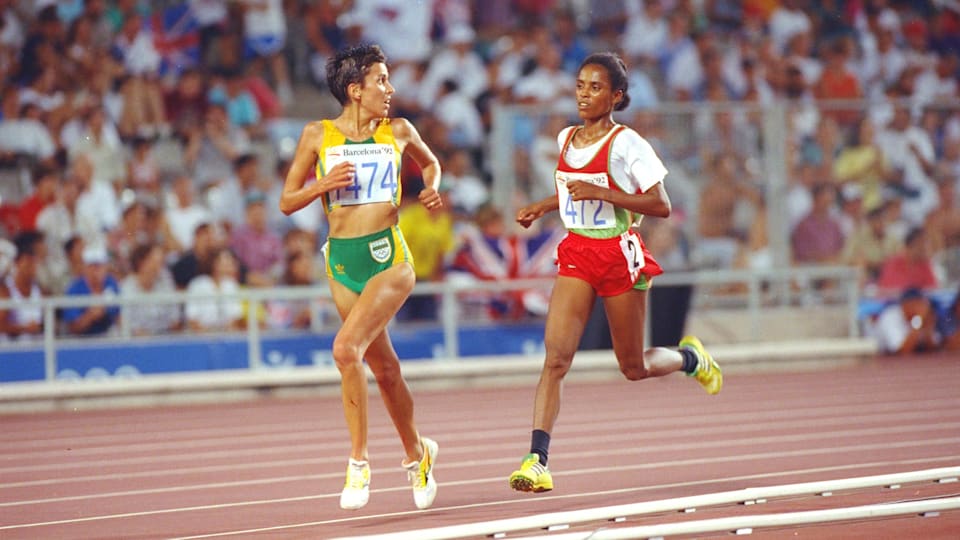Elana Meyer on running through apartheid and creating history at Barcelona 1992
In 1992, Elana Meyer became the first South African to win an individual Olympic medal in 32 years, taking silver in the women’s 10,000m in Barcelona. Here, she reveals the reality of being a world-class athlete during apartheid and what it was like to participate in her country’s return to the global stage.

Multiple generations of South Africans missed out on the opportunity to compete for Olympic glory from 1964 to 1992 due to the impact of apartheid, the nation’s racial segregation policy. When the newly reformed South Africa was invited to compete at the Olympic Games Barcelona 1992, female distance runner Elana Meyer was among those elated by the longed-for opportunity.
What was it like being a world-class athlete in South Africa during the 1980s and early 1990s?
For many years I was competing and Zola Budd [1985 and 1986 world cross-country champion] was in South Africa. We had this absolutely world-class, world phenomenon who I had been running against since I was 14 years old. For many years the competition in South Africa was just so tough and satisfying.
Zola used to beat me by big margins and I was just trying to improve, until 1984 when Zola got the chance to compete for the UK in Los Angeles. I also qualified that year to go to the Olympics.
It really struck me a couple of years later that I wanted to compete against the best in the world. For many years it didn’t really bother me because there was so much to chase in South Africa, but when I saw Zola competing, it made me very hungry to compete internationally. And I kept improving year after year after year, and then missed out again on the 1988 Olympics.
How did it feel when things started to change in South Africa?
In the early 1990s, when Nelson Mandela was released from prison, it became more of a reality that maybe that would also free us as athletes and give us the opportunity to compete internationally. By then my times were really competitive with international athletes. And Zola came back to South Africa, and I beat her for the first time.
Then I really wanted to compete against athletes not only on paper. In early 1991, I ran the fastest 3,000m in the world. I knew on paper I was competitive, but I had never raced outside South Africa, ever. It became more difficult. In 1991, we were hoping we would be ready to go to the World Championships, but in South Africa we had different athlete bodies and they had to become one unified body, and that took a while.
I went to watch the 1991 World Championships in the stands… That really made me realise for the first time that I should be there, on the track competing against the best athletes. That last year I was getting a bit frustrated.
How did you approach 1992, after getting the green light to compete at the Olympic Games in Barcelona?
Liz McColgan [of Great Britain] was the reigning world champion, so I thought it would be good to get a couple of races against the best in the world, but somehow I didn’t manage to get in the same races Liz was running. My first race in Europe was in the Netherlands. I ran a 3,000m and was beaten by Sonia O’Sullivan [the Irish athlete who would win silver in the 5,000m at Sydney 2000]. From there I went to Stockholm and won the 5,000m. Then I ran in Nice, but I couldn’t get in the 3,000m which Liz McColgan was running, so I had to run 1,500m.
It gave me enough confidence to know I was in good shape and ready to take on the world.
How did you cope with being asked for your views on the political situation in South Africa?
As athletes, you always want to try and focus on your sport, but at that stage, I was 25 years old and [with] Zola [Budd], I saw what had happened to her. She was 18 years old when she left the country and represented the UK… I saw and followed the difficulties she had, so I realised that, even though I didn’t want to be a political pawn, I also had the responsibility to respond and to express my opinions.
It was a good learning [experience] for me to see that you cannot say, “I am not political”. Going into the international world, I knew you had to stand up for what you believe, and you have to believe in something. You can’t just be the runner who focuses on your running. You will be questioned.
Whenever I arrived at an event there were press conferences at the airport, and it was mostly political questions. Maybe the last question at the end would be, “What are you expecting from the race?”.
I knew people were not only interested in South African runners; they were also interested in the history of the country and the impact that apartheid had on athletes and individuals. I knew it was not only about athletics, but also human rights.
How did it feel when you arrived in Barcelona to run at your first Olympic Games?
When I arrived in Barcelona it was, “OK, we are here, it’s true. Finally we are going to have the chance to compete”. It was such a mixed bag of emotions. I was relieved, excited, hungry.
